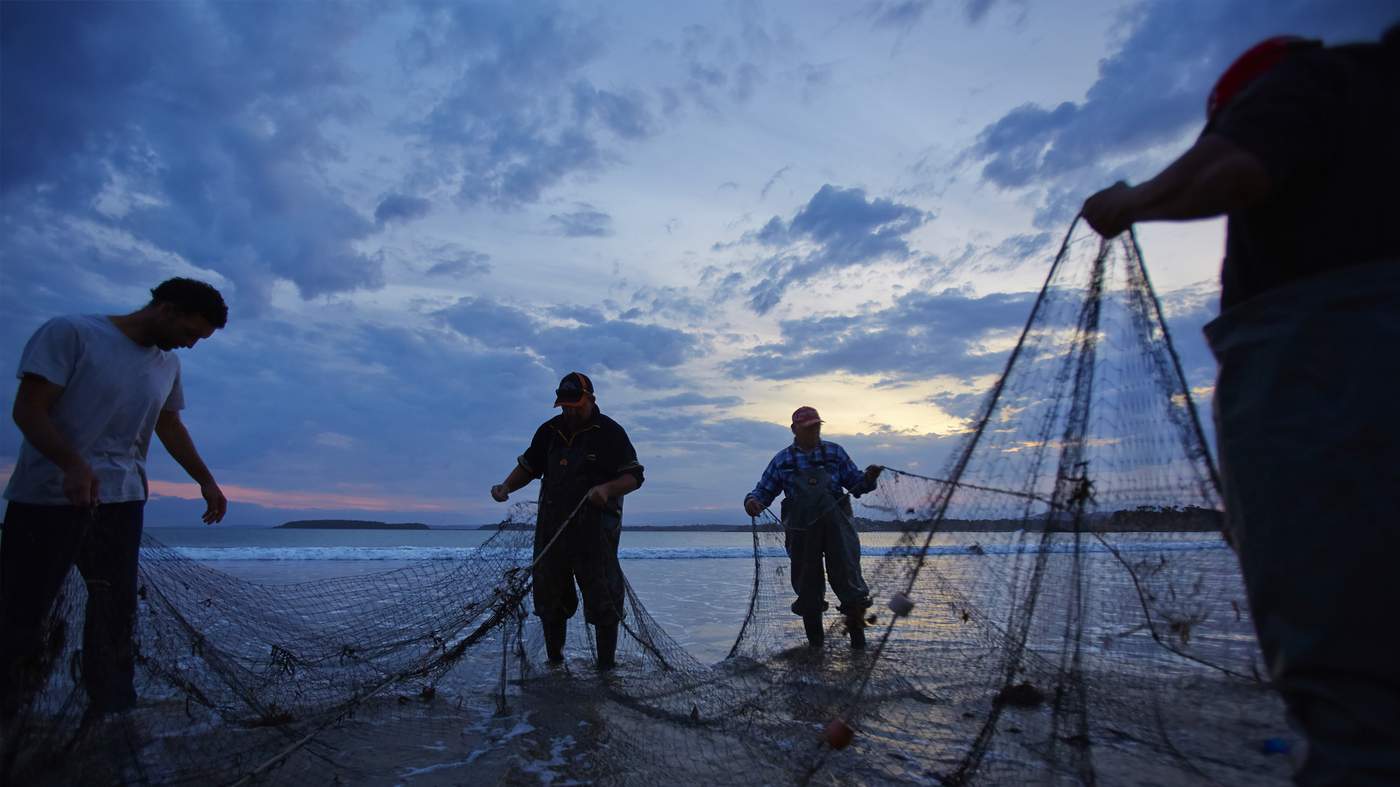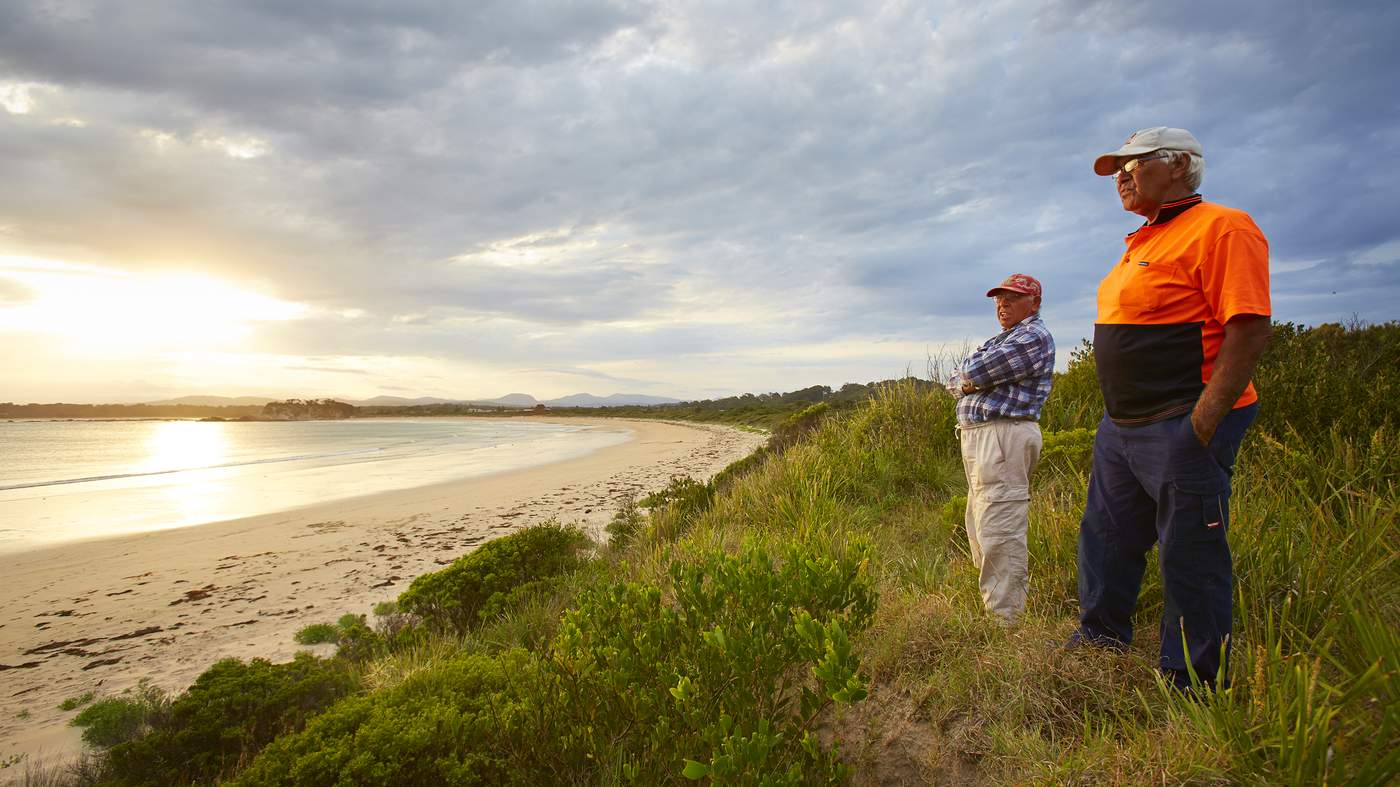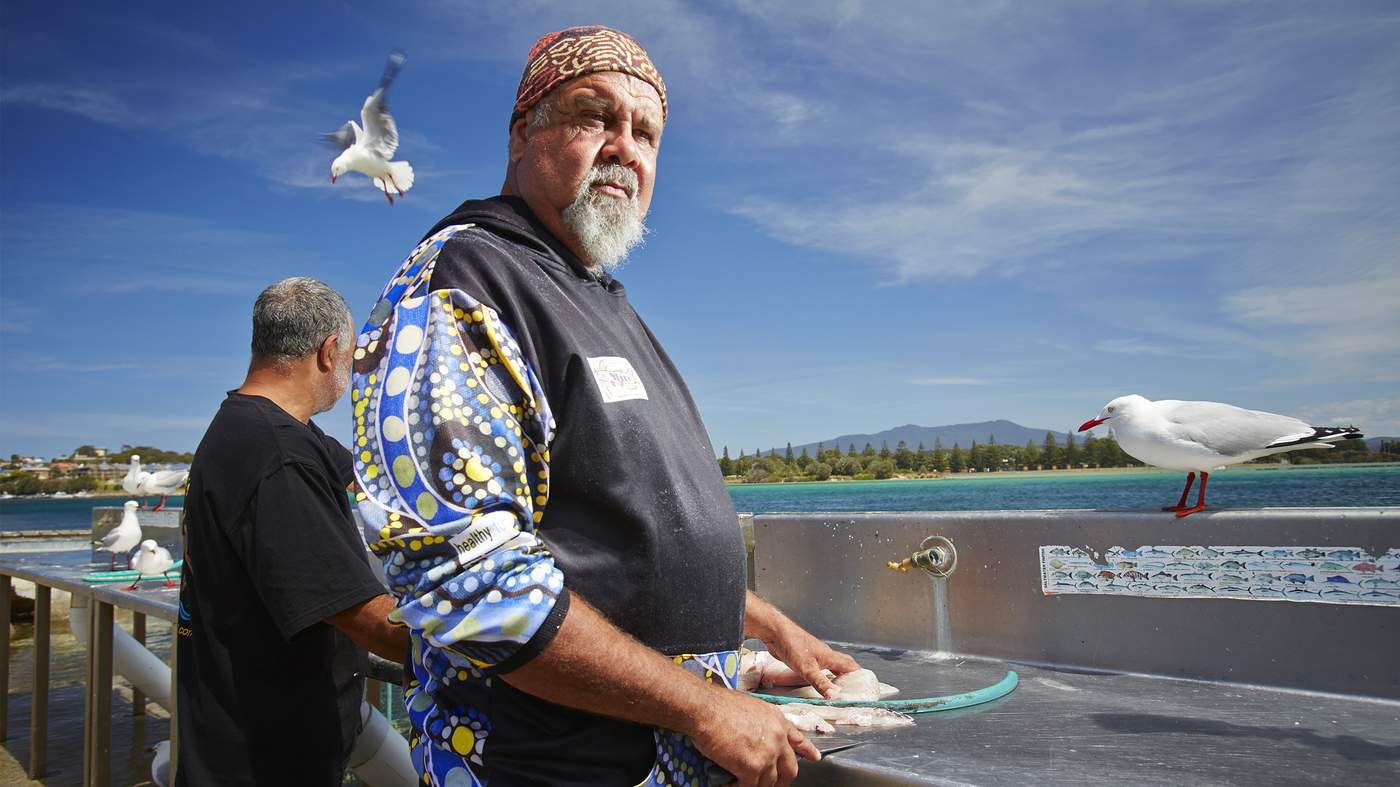
The fish and the people of the Yuin nation met long before any government sold a fishing licence. Despite native title claims, today's cultural fishermen can face hefty fines and even gaol for taking what's in the sea.


Waves roll in perfect sets to crescent sands from rough seas. Andrew Nye drives out of Moruya town, down straight roads hemmed in by endless spotted gums, stringybark and ironbark eucalypts, to where the mullet run.
He is a fifth-generation Aboriginal commercial fisherman, 65, from Mogo, NSW, one of only two remaining on the state's south coast. He has an air of dignity.
We head north, like the mullet. At North Broulee, we walk to look over Shark Bay, where a narrow isthmus leads to a small island. Nye points out a strip of sand south of the isthmus. That's where he sets his boat to wait, sitting on dunes or in the bushes, out of the wind.
“You look at the ocean, the sky, over the mountains, at the dirt along the beach,” he says.“You feel really connected to the land and the sea, and time just flies past.”
In weather like this, with the wind up, the fish come in February and pass by in a few days, not lingering off the beaches. Despite that, the fishermen took 30 tonnes this season – not even 20 per cent of what went by them. If the weather stays fine, the mullet travel in March and stay longer.

Even smaller fines can escalate quickly: if they're not paid, then driving licences can be seized and gaol terms are possible.

Fishing’s in his blood, says Nye, and it will be until the day he dies. He tells a story of driving through nearby Bombo with the area's other Aboriginal commercial fisherman, 62-year-old John Brierly from Moruya, when Nye suddenly sensed fish and said, "There's a patch of salmon out there, you can see them in the waves".
He says when he's down the club with his missus and talks about fishing, she tells him, "You never shut up, you probably even talk about fishing when you're asleep!".
Brierly, too, is a born fisherman. He left school at 12, to fish.


Recreational fishing is Australia's biggest sport and leisure activity. Millions enjoy the zen pleasure of casting a line off a jetty, rocks or a tinny. Some catch and release, others take a feed home, or leave empty-handed. But the stakes are higher for Nye – not just because his livelihood depends on it.
He's part of a campaign for Aboriginal cultural fishing rights on the South Coast land known as the Yuin nation. Such rights were recognised in section 21AA, one of several amendments to the state’s Fisheries Management Act passed in 2009.
“Our concern was always to ensure that Aboriginal people did not continue to be prosecuted for undertaking their inherent right to fish”, said Michael Bell, chair of the state native title service provider NTSCORP, welcoming the move at the time.


But section 21AA is yet to be enacted. In the years since it was passed, more than 530 offences were recorded by NSW Aboriginal fishermen – nearly 40 per cent on the South Coast – including 223 prosecutions and 112 infringement notices, according to Greens MLC David Shoebridge.
The cases that make the news usually involve abalone, once sold for sixpence a pound but now part of a multi-million dollar industry. There have been verbal and written cautions, and fines totalling tens of thousands of dollars levied on individuals. Even smaller fines can escalate quickly: if they're not paid, then driving licences can be seized and gaol terms are possible.

“I don't want to see young people continue down the path of being made criminals. Their parents grew up on the ocean.”

"Last year, the NSW Aboriginal Fishing Rights Group (AFRG) was launched on Facebook. It now has more than 2000 members and has held a protest rally against the actions of NSW Fisheries, part of the Department of Primary Industries (DPI).
In early September, 150 people attended the biggest ever Aboriginal cultural fishing gathering on the South Coast, at Bingie. Greens MLC Jan Barham spoke. She has since read a petition to the NSW Parliament calling for section 21AA to be enacted and says Niall Blair, the Nationals Minister for Primary Industries, has been “responsive and is looking into [the issue]… he's a very reasonable guy”.
For now, Aboriginal fishermen have taken to informing Fisheries via the AFRG page whenever they head out.
“Just a heads up,” read one post from September 15. “I'm going for a splash to get a feed for the mob: Mum, Dad, Aunty D and Uncle Rob… Marine park look out. Letting you all know now before I get caught and labelled poacher.”
John Brierly told Fisheries about a Barlings Beach rally where nets were shot and divers took abalone. He says officers watched from afar, but took no action.
At the heart of the dispute is a disagreement about the definition of cultural fishing. For the Yuin, cultural fishing is also commercial.
“We've always done it as cultural, business and everything,” says Brierly.
Aboriginal men defined themselves as fishermen in church records in the 1800s, when the industry was largely left to them. In Aboriginal History Vol 31, native title historian Michael Bennett wrote, “As the 19th century proceeded, Aboriginal people increasingly sold fish to local white residents as another means to raise money.”
But the DPI wants to regulate it, calling it “fishing activities and practices carried out by Aboriginal persons for the purpose of satisfying their personal, domestic or communal needs, or for educational, ceremonial or other traditional purposes, and which do not have a commercial purpose”.
“They think we should be walking around with no fucking clothes on, throwing a spear,” says AFRG Facebook moderator Wally Stewart.

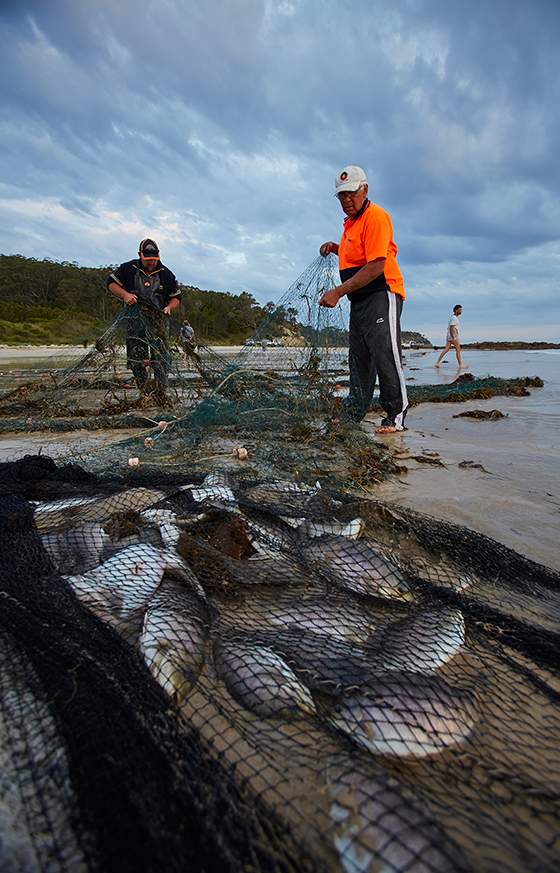
Beach hauling

He is sat at a Moruya cafe with Nye, Brierly, and fellow moderator Robert Chewying. Stewart, a solidly built 55-year-old from Narooma, runs an Aboriginal funeral-related business. Chewying, who has a cloud of white hair, is more softly spoken but just as passionate and works in the horticultural industry.
“You have this wonderful word, poaching,” says the 52-year-old, from Nowra. “You've been taught all your life you can go in the water, then you've got the government saying you're allowed a couple of abalone. Now you've got Indigenous people saying ‘you can get stuffed, I'm going to go in the water, I don't care what you think’.”

“They spend all this money to keep us out of the ocean.”

So what is cultural fishing? Brierly can't explain it. He can only describe what happens. Going to the beach or water is like heaven, he says. He doesn't need anyone to tell him where the fish are. He could be sitting at home drinking coffee, see a certain wind blow and know it's time to leave.
“It's already built into you,” he says, “where the tide is and how long you've got to wait before the fish come. It's a natural thing.”
“There's that real connection of the water, fishing and just being involved in the sea,” says Chewying. “You can't get it out of people down here and it will not go away.”
The men say cultural fishing wouldn't exhaust areas of marine life.
“It's our culture,” says Nye. “We've looked after it for 40,000 years. We know how to manage it.”
The men complain local Aboriginal people have long been marginalised with costs, access, regulations and poor oversight of existing resources. Brierly, who hopes to see an Aboriginal-run fishery, glowers when talking about a trawler at Coila Lake which worked non-stop for two weeks.
“If they keep going like that, we’re going to have a dead lake,” he says.


The draft regulations don’t allow for sale of cultural catch. A consultation period, first promoted with a stall at Dubbo’s Aboriginal Rugby League Knockout in October, ends on November 9. A DPI spokesperson says “many” at the stall indicated they’d be giving feedback.
The spokesperson says the six-year delay in issuing draft regulations was due to factors including engaging with all stakeholders, they said, including “most importantly” Aboriginal people.

“We might get a black Santa Claus and dress him up as a fishing inspector handing out licences.”

“This regulation will provide formal recognition, certainty and daily access arrangements for all Aboriginal people in NSW when engaging in cultural activities … [and] greater certainty for management of the resource so it can continue to be sustainably shared by everyone.”
After the draft was released, Stewart posted a furious message, all in capital letters, to the AFRG page. It read in part, “It's taken you six years to introduce S21AA and now you want to water it down!”
He's still annoyed when we speak by phone.

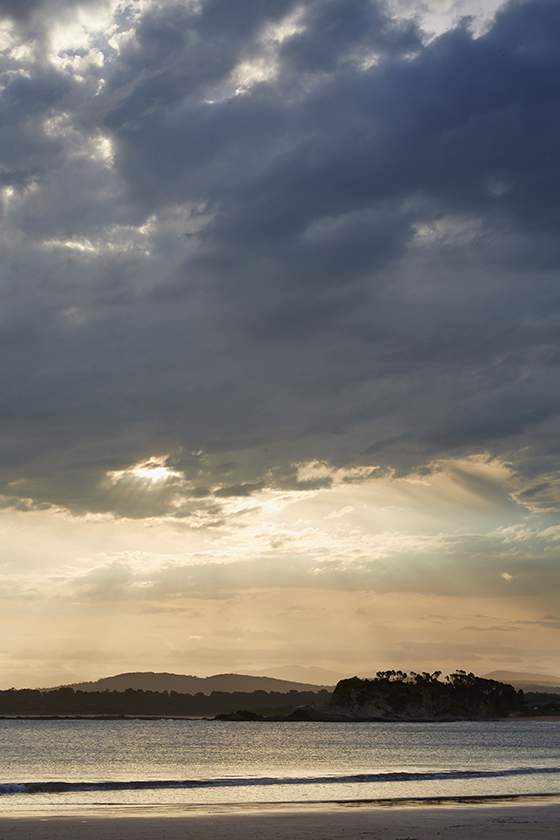
Barlings Beach

“No way am I happy,” he says. “We've been jumping up and down, now they want to water it down. We don't accept any regulations. We're saying, sit down and talk to us. Let's work together.”
He’s staying positive. Next up is a Christmas party on Broulee Beach.
“We might get a black Santa Claus and dress him up as a fishing inspector handing out licences,” he says. “Nah! It's for all the kids and the community. We'll get there and show a united front.”
The group wants to commission a case study of the impact the DPI has had on cultural fishing locally and develop a business plan for culture-commercial fishing. MP David Shoebridge says he'll monitor the regulations and if they don't “deliver in the spirit of the law”, he'll consider taking them to the state parliament to be disallowed.
There's also talk of a native title claim, which would be the first in NSW over water. Danny Chapman has said the claim could lead to commercial activities.
“I know from all the history,” Tony McAvoy told an AFRG rally, “… you've probably got the best evidence on the NSW coast. If there's anyone who's going to win it, it will be you mob here.”
At South Broulee, Andrew Nye takes me to a breakwall, which tapers away from the shore like a V, where the mullet lie deep, rising to the surface as the sun climbs higher and the water heats up.
Decades on, the fight for Aboriginal fishing rights is also seeing the light.



